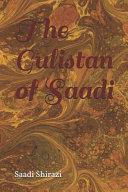Alternative translation:
The children of Adam are limbs of a whole
Having been created of one essence.
When the calamity of time afflicts one limb
The other limbs cannot remain at rest.
If you have no sympathy for the troubles of others
You are not worthy to be called by the name of "man".
Source: Gulistan (1258), Chapter 1, story 10
Quotes from book
Gulistan of Sa'di

The Gulistan is a landmark of Persian literature, perhaps its single most influential work of prose. Written in 1258 CE, it is one of two major works of the Persian poet Sa'di, considered one of the greatest medieval Persian poets. It is also one of his most popular books, and has proved deeply influential in the West as well as the East. The Gulistan is a collection of poems and stories, just as a rose-garden is a collection of roses. It is widely quoted as a source of wisdom. The well-known aphorism still frequently repeated in the western world, about being sad because one has no shoes until one meets the man who has no feet "whereupon I thanked Providence for its bounty to myself" is from the Gulistan.The minimalist plots of the Gulistan's stories are expressed with precise language and psychological insight, creating a "poetry of ideas" with the concision of mathematical formulas. The book explores virtually every major issue faced by humankind, with both an optimistic and a subtly satirical tone. There is much advice for rulers, in this way coming within the mirror for princes genre. But as Eastwick comments in his introduction to the work, there is a common saying in Persian, "Each word of Sa'di has seventy-two meanings", and the stories, alongside their entertainment value and practical and moral dimension, frequently focus on the conduct of dervishes and are said to contain Sufi teachings. Idries Shah elaborates further. "The place won by the Gulistan as a book of moral uplift invariably given to the literate young has had the effect of establishing a basic Sufic potential in the minds of its readers."
Chapter 3, story 28 http://books.google.com/books?id=LDpbAAAAQAAJ&q=%22use+a+sweet+tongue+courtesy+and+gentleness+and+thou+mayst+manage+to+guide+an+elephant+with+a+hair%22&pg=PA292#v=onepage
Gulistan (1258)
Chapter 3, story 28 http://books.google.com/books?id=LDpbAAAAQAAJ&q=%22use+a+sweet+tongue+courtesy+and+gentleness+and+thou+mayst+manage+to+guide+an+elephant+with+a+hair%22&pg=PA292#v=onepage
Gulistan (1258)
“Whatever is produced in haste goes easily to waste.”
Source: Gulistan (1258), Chapter 8, story 36
Source: Gulistan (1258), Chapter 3, story 19. Translated by Sir Edwin Arnold. ( Persian version https://ganjoor.net/saadi/golestan/gbab3/sh18/)